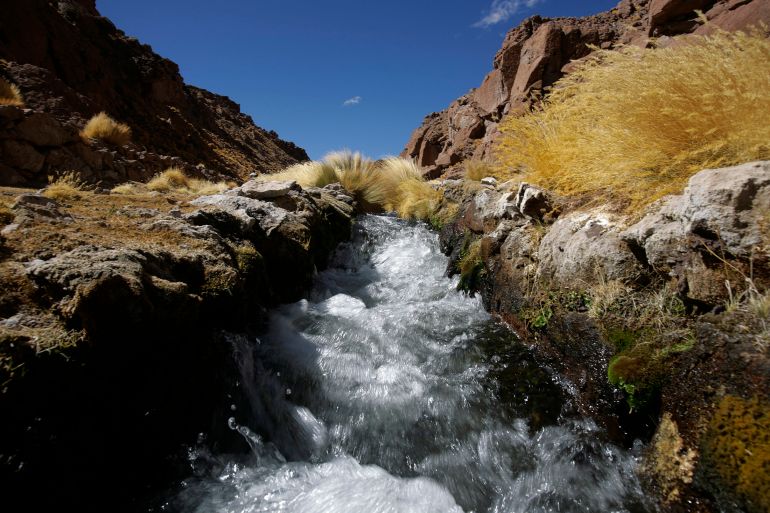ICJ declines to issue decision in Chile-Bolivia river dispute
Hague-based UN court issues a ‘surprise’ judgement in Silala River case, saying Chile and Bolivia are in agreement.

The International Court of Justice (ICJ) has declined to issue a decision in an international dispute over the Silala River, one of several water-related issues that have spurred tensions between Chile and Bolivia.
Chile is in the middle of an historic, massive 13-year drought, and Bolivia is likewise experiencing parched conditions, as La Nina weather conditions return to the region for a third straight year, causing a shortage of rain.
Keep reading
list of 3 itemsPhotos: Sporadic clashes as Chile marks coup anniversary
Photos: Brazil’s Amazon faces severe drought
But in its judgement on Thursday, the Hague-based, United Nations court said the two countries appeared to be in agreement about the river’s status as “an international watercourse”, subject to international law.
The judges urged the South American neighbours to work together on issues surrounding the frontier waterway, saying a “shared resource can only be protected through cooperation”.
The dispute over the Silala stretches back to 1999, when Bolivia’s Ministry of Foreign Affairs addressed a statement to Chile that said the Silala lacked “any characteristic of a river, let alone of an international river of a successive course”.
The Bolivian government instead described the Silala as a wetland, originating from springs on the Bolivian side of the border. It asserted that the water’s flow had been created by means of “artificially enhanced” channels and draining mechanisms.

The dispute escalated in June 2016 when Chile filed a lawsuit calling on the international court to declare the Silala an international waterway, after Bolivia indicated it would charge for use of its waters.
Mining operations on the Chilean side of the border rely, in part, on the Silala’s waters, which flow through the Atacama Desert, one of the driest places on earth.
“Because of the underlying issues of politics, economics, sovereignty and history, the Silala has become one of the most hydropolitically vulnerable basins in the world,” a 2007 United Nations report said, citing the Silala’s use in Chile’s copper-mining industry.
But Bolivia counter-sued, claiming that Chile had “illegally” taken the Silala’s water. It also asserted sovereignty over the channels and draining mechanisms built on its side of the Silala, asking that the court acknowledge its right to demand compensation for any water delivered through those artificial channels.
“They stole our water and showed us what kind of neighbour they could be,” then-President Evo Morales of Bolivia said in 2016.
But over the course of the six-year lawsuit, the judges found that there was “acknowledgement by Bolivia during oral proceedings that the Silala waters qualify in their entirety as an international watercourse under customary international law”.
The judgement by the ICJ – the UN court for resolving disputes between states – also said that international law applies to both “naturally flowing” and “artificially enhanced” surface flow on the river.
Since the “parties agree with respect to the legal status of the Silala River”, the court declared that there was no need for the judges to pronounce a decision on the matter.
“Today’s Judgment of the Court most likely comes as a surprise to the Parties, in particular the Applicant [Chile]. In fact, it decides almost nothing,” Judge Peter Tomka wrote in a declaration accompanying the ruling.
“It remains to be seen what useful role, if any, this Judgment will play in the relations between Chile and Bolivia.”
Bolivia severed diplomatic ties with Chile in 1978, following failed negotiations to give Bolivia access to the sea. The country had become landlocked nearly a century earlier, during the so-called War of the Pacific, when Chile defeated Peru and Bolivia to acquire disputed territories along the countries’ borders.
The question of ocean access has been a longstanding one for Bolivians, who filed international proceedings against Chile over the issue in 2013. The ICJ ruled in favour of Chile in 2018.
The two countries also have been at odds over the use of the shared Lauca River, which originates in Chile and empties into Bolivia’s Coipasa Lake.
On Thursday, Chilean President Gabriel Boric applauded the ICJ’s decision on the Silala, telling reporters at the presidential palace, “Chile went to the court for judicial certainty and got it.”
Meanwhile, Bolivia’s minister of foreign affairs, Rogelio Mayta, issued a statement saying “the controversy over nature and use of the Silala river’s waters has concluded.”
“From now on, based on the ruling, Bolivia will exercise the rights it has over the waters of the Silala River,” he said.